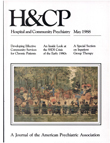Use of Services by Cognitively Impaired Elderly Persons Residing in the Community
Abstract
Although the number of demented elderly dwelling in the community is high, little is known about this group and their needs. An important step in learning about that population is to estimate the bunden that results from an elderly person's cognitive impairment. Our findings substantiate commonly held beliefs that the cogni- tively impaired represent an increased burden, particularly on sources of informal care, and suggest that care of demented individuals rests almost exclusively with family and friends.
Compared with the nonimpained subjects, the severely cognitively impaired elderly used significantly fewer health services. Their underutilization of medical care requires serious attention and further investigation. Demented individuals may be incapable of making their needs known and may be discouraged from utilizing health services because clinicians feel pessimistic about effecting change in their conditions.
The higher rates of personal care provided for the cognitively impaired elderly support the MMSE as an instrument for successfully identifying dementia. The high level of need of the cognitiveby impaired subjects was reflected in their significantly greater use of more than one helper and the significantly greater number of chores that helpers performed on their behalf. Those findings pro- vide a basis for further examination of the needs and care of demented individuals
Access content
To read the fulltext, please use one of the options below to sign in or purchase access.- Personal login
- Institutional Login
- Sign in via OpenAthens
- Register for access
-
Please login/register if you wish to pair your device and check access availability.
Not a subscriber?
PsychiatryOnline subscription options offer access to the DSM-5 library, books, journals, CME, and patient resources. This all-in-one virtual library provides psychiatrists and mental health professionals with key resources for diagnosis, treatment, research, and professional development.
Need more help? PsychiatryOnline Customer Service may be reached by emailing [email protected] or by calling 800-368-5777 (in the U.S.) or 703-907-7322 (outside the U.S.).



